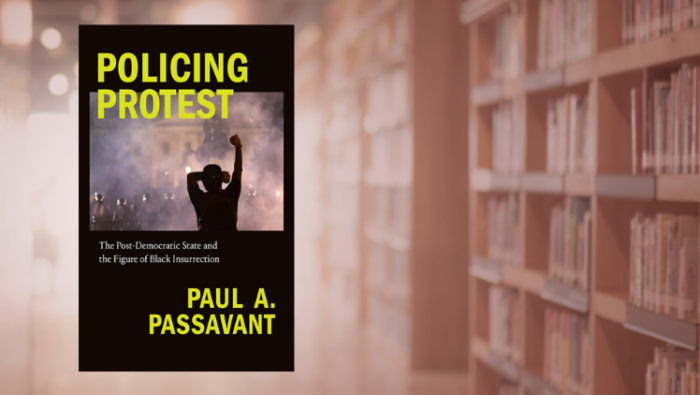
Black Lives, ‘Not a Big Deal’

Audiences all over the world know, and perhaps even watched, the brutal killing of Eric Garner at the hands of an NYPD policeman who put him in a chokehold for selling loose cigarettes in Staten Island. His last words, ‘I can’t breathe’, reverberated around the globe sparking a tsunami of protests animating the Black Lives Matter movement. What many of us may not know was that when NYPD commander, Lieutenant Christopher Bannon, was informed by text message that Garner was ‘most likely dead on arrival’ he responded, ‘Not a big deal.’
This detail forms part of Paul Passavant’s rigorous analysis of Policing Protest in the United States, a pattern of policing that he persuasively describes as ‘neo-liberal authoritarianism.’ In Policing Protest: The Post-Democratic State and the Figure of Black Insurrection, Passavant chronicles the change in policing from a model which tolerated and indeed protected democratic protest, to a model which was suspicious of and sought to stamp out protest. This change, Passavant argues, was part of wider cultural and political transformations ushering in the neo-liberal state, a change that was accelerated and strengthened by the attacks of September 11.
Passavant charts the rise of neo-liberal authoritarianism to three crises, all three, he argues, ghosted by the figure of black insurrection. The 1960s crime crisis was none other than the ‘crime’ of the civil rights movement, starting with Nixon’s conflation of civil rights protests with violence and today’s elision of protest with terrorism. The urban fiscal crisis brought austerity to replace welfare, welfare which reactionaries again viewed as being for black people. And the crisis of democracy was the perceived ‘overloading’ of the system by, as Harvard’s Samuel Huntington bluntly put it in 1975, ‘marginal social groups, as in the case of blacks … now becoming full participants in the system.’ These crises, and the excessive police reaction to them, are none other than a response to the demand that black lives matter, that black people share political power. It is no surprise then, Passavant argues, that the crises intersect with particular intensity in the policing of #BlackLivesMatter.
Passavant’s analysis of legal cases bolstering the retreat from civil rights is as thorough as his historical and political analyses, even as it charts the same grim pattern: neo-liberal authoritarianism, he describes, comes equipped with its own aesthetic, that of frictionless consumerism. While in the 1970s courts construed shopping malls as public spaces where the exercise of free speech overrode private property rights, by the 1990s courts restricted the exercise of free speech in the interests of friction-free shopping. The close reading of caselaw is sensitive to the nuances, and the pitfalls of judicial interpretation in the common law tradition, a method we are familiar with in law but less so in political theory. Recent jurisprudence Passavant shows, pulls back civil rights protections, even, alarmingly, when the judges themselves acknowledge that the police caged demonstrators in conditions that were no different from that of internment camps. The result is to insulate public spaces from political antagonism: aggressive policing means the public is less willing not only to join the protesters but even to find out what the protest is about, for fear of being perceived as a protester. Political antagonism is not only neutralised but prevented from appearing altogether.
The precedence given to property rights can give the impression that neo-liberal states are efficient bureaucratic factories in the service of the market. Passavant is quick to dispel this facile correspondence. Yes, protection of the market is the neo-liberal state’s priority to which other goods, including democratic participation, take poor second place. The state, however, is neither small, nor weak; it is accompanied by and inspires strong authoritarian impulses and affects. The increasing militarisation of policing and surveillance tactics is testament to this shift.
Another detail shared by Passavant is telling in this context: the NYPD officer who made good on his threat to take a Black Lives Matters activist to ‘somewhere no one can find you’ had also served at the infamous Abu Ghraib jail whose torture of Iraqi prisoners was uncovered by Wikileaks. Like the abuses at Abu Ghraib, far from being an isolated bad apple in an otherwise functioning system, such excess Passavant shows, is part and parcel of the machinery of policing. Passavant reminds us of the enjoyment police derive from such abuses. We can add, it is not only the abuses the perpetrators enjoy but the fact that they share an illicit dirty secret, a secret which binds them to each other in guilty enjoyment. Psychoanalysts of course have long appreciated the role of enjoyment in law and politics so it is refreshing to see political theorists emphasise this role and illustrate its results: authoritarian neo-liberal states, Passavant concludes, extract and maintain support because of, not despite, abusive policing.

